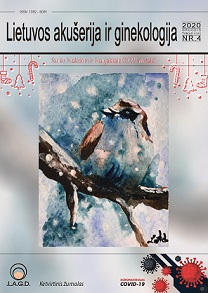RELATIONSHIP BETWEEN COL1A1 GENE POLYMORPHISM AND STRESS URINARY INCONTINENCE AMONG MIDDLE AGE AND OLDER WOMEN (CASE-CONTROL STUDY)
Abstract
The aim of the study. To evaluate the frequency of the polymorphism of the collagen type I alpha-1 COL1A1 (rs1800012) gene and its combinations in the case of stress urinary incontinence in middle age and elderly women. Results. Subjects in the urinary incontinence group had significantly higher body mass index (BMI) and positive family history for urinary incontinence. No reliable association between COL1A1 G> T polymorphism and stress urinary incontinence was observed after multivariate logistic regression and inheritance model and allele genotypes. Conclusion. Summarizing our study, we can conclude that no association between COL1A1 G> T polymorphism and stress urinary incontinence was observed when the inheritance model and allele genotypes were evaluated.

